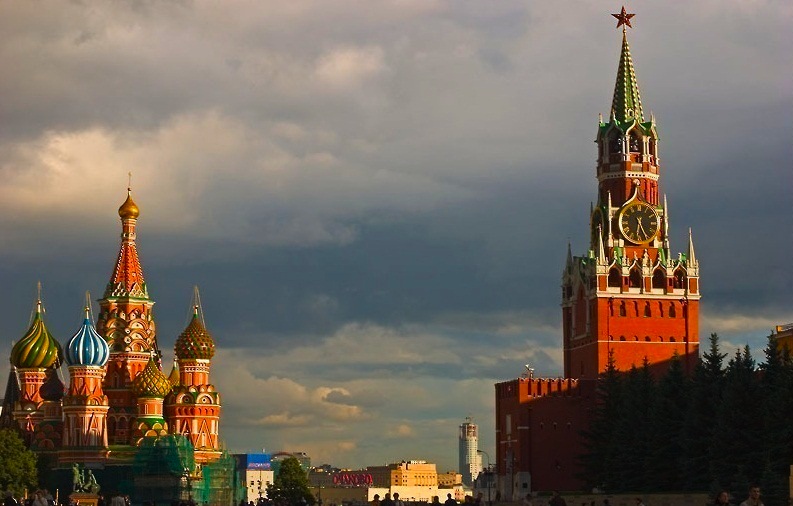… Russia has to raise the dilemma for the West: if you are attacking Syria in violation of the international law, we occupy the Baltic states,” he added.
Aleksandrov continued, “I think that the deployment of Russian troops in the Baltic costs minimal losses, if at all without a loss. … Moreover, I think that half of the population of Latvia and Estonia will meet the Russian troops with flowers, as it was in 1940.”
While Aleksandrov's proposal was generally not shrugged off as a silly and impulsive emotional reaction to the Syrian crisis, Russian politician Vladimir Zirinovski's similar reaction was taken as a childish outburst by a vulgar political clown who regularly vents outrageously ignorant tirades.
It was thought however that Aleksandrov's aggressive stance was not one to be simply dismissed as ludicrous. After all he is a former diplomat, currently a senior scholar at a respected institute, considered to be totally knowledgeable of the countries which are being continually scrutinized (Baltic states) and thereby a credible, trustworthy advisor to the leadership in Russia. The political elite base their decisions partially on the advice which he provides them.
Therefore many in Estonia, rather than dismissing Aleksandrov's thoughts as the usual Pavlovian reaction regarding the Baltic states, insisted that threats were clearly not childishly innocent but outright provocative. In addition they were offered by a person, with previous diplomatic experience, who knows what such proposals may cause. It was, however public knowledge that two days before Aleksandrov's statement, the Russian foreign minister Sergey Lavrov said that Russia would not use military power should Western countries attack Syria. It has been agreed that Aleksandrov's views reflect the typical Russian 19th century imperialistic attitude that at least the peripheral countries are really Russia's to either own or control. It's a deeply rooted idea that can only be abandoned with changes in Russian generations.
The current threats are only too reminiscent of Russian threats to the Baltic states in the past. Threatening the Baltic states with occupation has been a tiresome tactic that stretches back to the post-1991 period when practically every week someone within the Russian military leadership or governmental elite would proclaim the necessity for invading and taking back that to which they have an undeniable right.
One recalls the ebb and flow of Moscow's intimidation being at its peak during the period prior to the Baltic states joining NATO and the European Union. A unforgettable situation was created in 2007 with the relocation of an unprepossessing bronze statue of a Soviet soldier from central Tallinn to a military cemetery. It was generally accepted that the statue was an insulting monument promoting empire and totalitarian rule that Russians have erected throughout their formerly occupied territories. The initiative to remove it was an eminently rational one. But this time the threats had a more menacing tone to them because they were issued in a physical conflict setting in which foreign nationals were clearly involved. Russian media referred to rioters who had been arrested for looting and destruction of property as ‘heroes'.
Immediately following the removal, destructive demonstrations broke out across Tallinn. It was general recognized that these outbursts were Moscow-inspired. Ostensibly the riots were reactions to the disrespect of the Soviet heroes of World War II. Russian demonstrators including students were bussed into Tallinn from distant locations. These riots were encouraged in tandem with angry mobs targeting Estonian embassies in Moscow. Oslo, Stockholm, Prague, Kiev, Riga, Minsk, Helsinki and elsewhere. Such widespread unrest does not reflect spontaneity and citizen initiative as claimed by the leaders.
A year after Moscow declared outrage at the relocation of the Soviet memorial. Russian army commander Juri Balujevski made a well considered proposal in 2008 of the take-over of the Baltic states should planned NATO expansion include Georgia and Ukraine. As far back as 1996 the Russian military were ready to invade the three Baltics should they make any effort to aspire to NATO membership.
These threats over the years have been called tedious, without any real substance, driven by emotions only, absurd, bullying, serious, childish, laughable, immature, impulsive, hollow, without credibility etc. No matter how the international community has viewed them one can't recall any effort on the part of the Russian foreign ministry denouncing them, at the very least distancing itself from such extreme and provocative statements.
But no matter how they have been perceived, they still seem to be instinctive, top-of-mind Russian reactions to bothersome situations. Their sense of entitlement regarding the Baltic countries, perhaps blinds them. Thus, substantive dichotomy sometimes accompanies their threats. Aleksandrov's proposal of occupying the Baltic state should the West attack Syria logically presupposes that the takeover of those three NATO members would be a tremendous loss to the West and therefore Washington would be forced to reconsider intervening in Syria. However Aleksandrov's assertion that invading the Baltic states would be militarily effortless in itself implies that the West wouldn't mount a fight to keep their freedom and independence, that the Baltic states hold minimal value for the West.
Should the threats be taken seriously? Most experts insist that a military intrusion by Moscow against a NATO and EU member is unlikely. After all trade between Russia and the Baltic states is healthy. The Estonia/Russia border treaty is ready for the final signatures. Some still urge caution. The primitive irrationality of the threats betrays an inherent deficiency in the Kremlin's decision-making. But to cry wolf with every one feels the menace is tedious and self-defeating.
Laas Leivat




